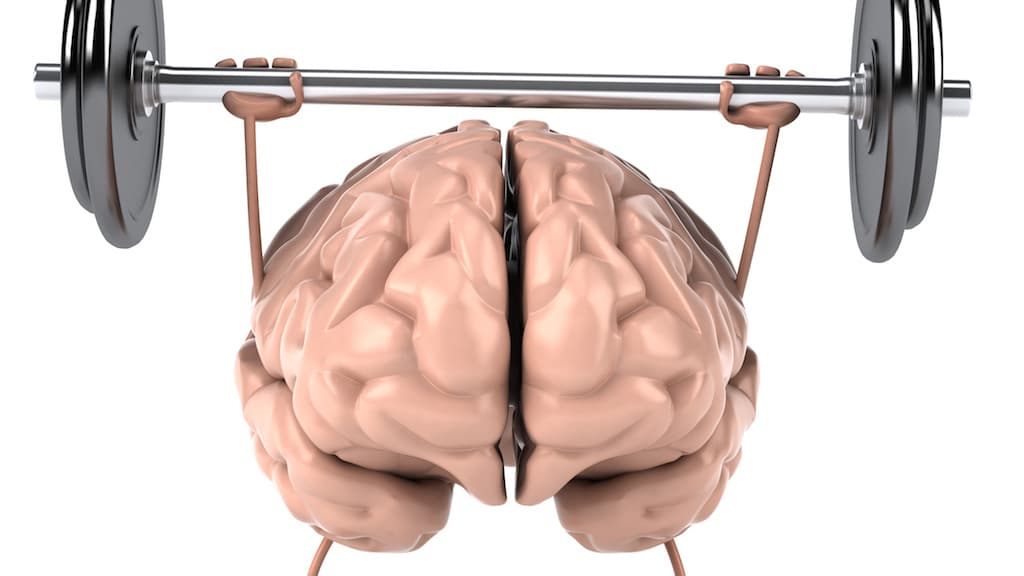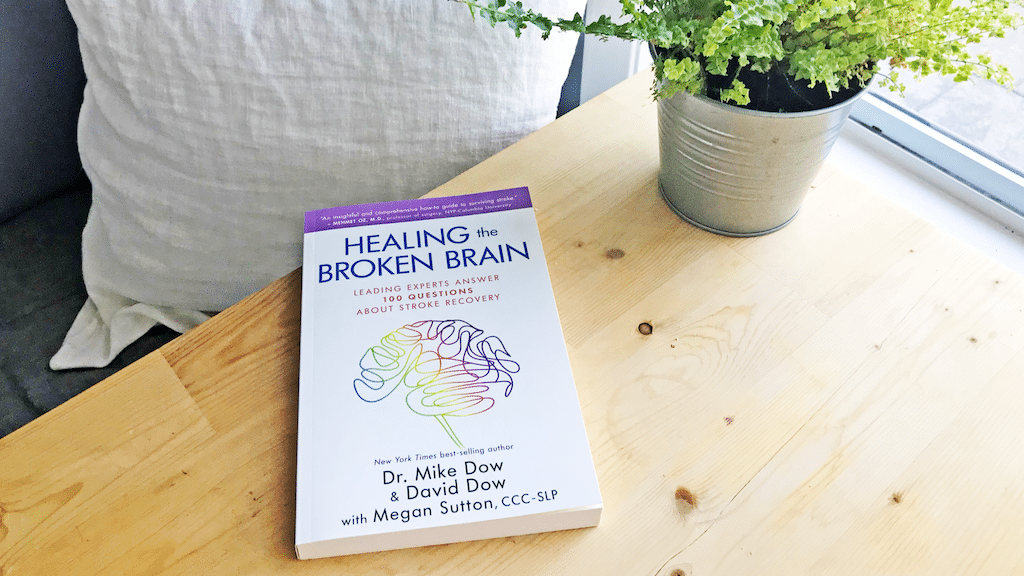The Truth about the Plateau in Stroke Recovery
6 min read
As a stroke survivor, you may have heard someone say, “You’ve reached a plateau,” or “You’re plateauing.” A plateau is high flat land, so what does it have to do with your stroke recovery?

Immediately after you have a stroke is when everything is at the very worst. You may be paralyzed, confused, and unable to speak. Each day you get better as your brain heals, recovering from the shock of the stroke. The progress in the first few weeks or months is often rapid— a steadily upward line on the recovery chart.
But then the slope of that line may start to grow more horizontal. The change doesn’t come as fast or as spontaneously. As that line flattens out, you’ll start to hear about a plateau in your progress. After you’ve reached it, it may feel like you’re stuck—unable to climb any higher. Therapists may start to suggest your therapy will end. Doctors might say this is the best you’ll ever be. And you know what? They might be right— if you believe them.
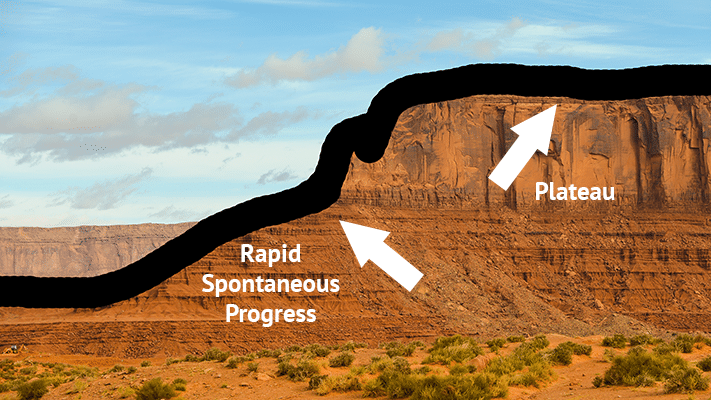
The Myth of the Plateau in Stroke Recovery
Lots of stroke survivors keep improving, years after their stroke. They say the plateau doesn’t exist – it’s a myth! But doctors are saying it’s real – that recovery slows or stops. So is the plateau in stroke recovery true, or is it a myth?
It’s both. While it’s true that spontaneous recovery in the brain does slow down after a period of time post-stroke, the key word there is spontaneous. That means it happens without you even trying. If you’re riding the wave of recovery, thinking each day is going to be better than the last, there will come a point when that stops being true. When you see that you’re not getting better, you may start to feel sad and hopeless. And then things really stop getting better. In fact, they may start to get worse because you’re depressed.
Related Article: The Under-Recognized Connection between Aphasia and Depression
The myth part of the plateau concept is that there’s nothing you can do about it. The brain can and will continue to change and improve if you work at it. Progress is absolutely possible years after stroke with focused exercises toward specific goals. It’s just not as easy as it was early on. You have to set a target, break it down into steps, and work on it repetitively. You may need to work on just one goal at a time. But you can make progress. You have to maintain your hope and motivation, and you’ll start to see change again.
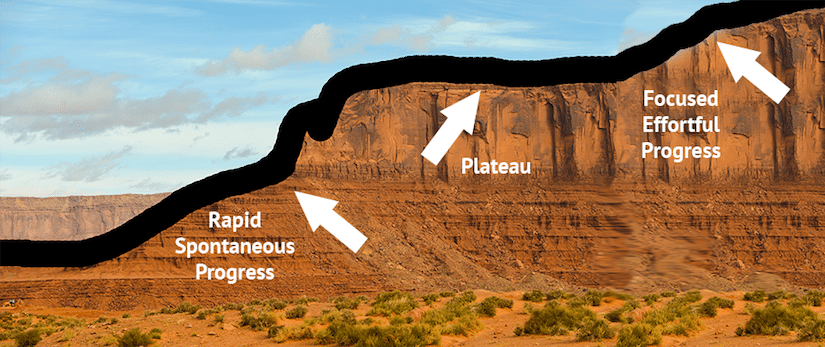
Ups and Downs in Stroke Recovery
There are always ups and downs in stroke recovery. Some days your skills may take a dip, or even a dive. If you’re tired, sick, overwhelmed, or stressed, your speech or mobility may suffer. These downturns may last a few hours, a few days, or even a few weeks. But over time, they’ll get better. If they don’t, it’s a good signal to go talk to your doctor or therapist to see if something else may be causing the decline. Usually, you’ll return to your best abilities once you’re rested or relaxed.
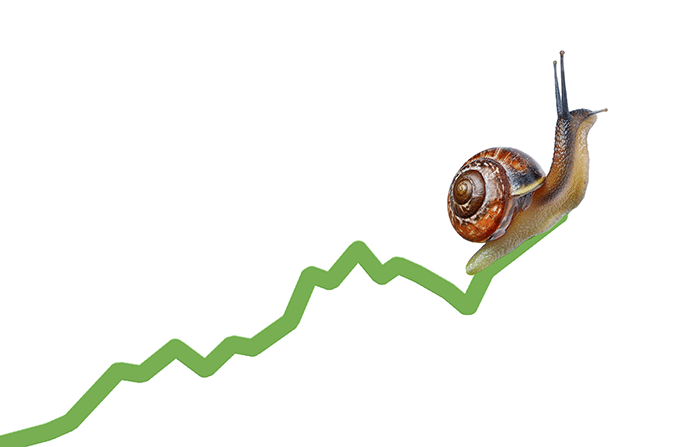
There are also exciting upturns, like when a full sentence comes out perfectly, or your finger moves in a way it never has before. This spark of recovery may only last a moment, but it’s good news. It often means your brain is ready for the next step.
With all the daily ups and downs, the important thing to focus on is the overall trend of recovery. What can you do today that you couldn’t do a month ago? How much better do you sound now than six months ago? Keeping a journal, a video diary, or weekly recordings of yourself can really help you to see the progress over time that you may not notice day-to-day.
Tactus Therapy apps make it easy to track your progress. You can send detailed reports after each session, then compare when you’re ready. Try our aphasia apps for free to see how you can keep your stroke recovery going. Not sure where to start? Our App Finder can help!
What to Do When You Reach a Plateau in Stroke Recovery
Since we know that progress can stall out, it’s important to understand how to jump-start recovery again. Here are some things you can try to get things moving again:
Stroke recovery isn’t easy, and it isn’t fast, but you can always make progress. Henry Ford famously said, “Whether you think you can, or think you can’t– you’re right.”
Download an aphasia-friendly version of this article now
We created a version of this important article to share with your loved one or client who is having trouble reading longer text.
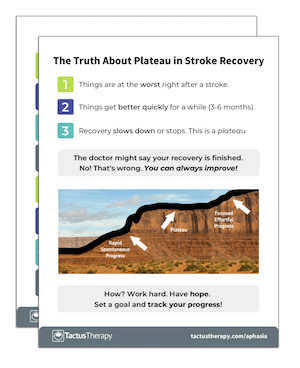
In addition to receiving your free download, you will also be added to our mailing list. You can unsubscribe at any time. Please make sure you read our Privacy Policy and Terms & Conditions.

